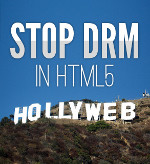Tell W3C: We don't want the Hollyweb
- Anmelden oder Registrieren um Kommentare zu schreiben
I think this move on the part of some corporate big players (including, most scandalously of all, the sometimes FOSS-friendly Google) is a travesty. This couldn't be more antithetical to the spirit of the Web.
Someone on some comment board said it well: putting DRM in HTML5 is the surest way to hasten development efforts on HTML6.
I hope Mozilla fights this tooth and nail.
1. These campaigns rarely stop anyone from using the technology that the FSF badmouths. It just makes the FSF look like a bunch of whiny tech evangelists who represent a minority of the overall audience.
Instead of protesting on the web and bugging people outside of stores, why don't they get together and show everyone an alternative in action? Use the resources they get from the donations to code something that RMS or someone from the FSF can go to the W3C or Google and show. Show that video can be served with open codecs like Opus, Ogg, and WebM without Flash and DRM.
If the video needs to be protected, show how the content could be served in a way where it can only be played on that domain or via a PGP key or something similar tied to that person who purchased the content. I'm just throwing out ideas here, but people listen when someone presents a concrete alternative instead of just running around with picketing signs.
2. Google will support FLOSS if it benefits them and them alone. They are no longer the cool and hip tech upstart they were over a decade ago and are now pretty much the same as Apple and Microsoft.
They employ tens of thousands of employees and are an advertisting company. They need your informtion when you search Google and the "social metrics" when you use Google Plus. They want you to use Google Docs so they can put you on a subscription plan. They tie the Android phones to their services so you become dependent on them and they use the information from those services to cater to advertisers.
3. Mozilla will fight it, but as we saw with the mobile Firefox web browser, they gave in to using H264. Aren't the desktop versions going to use H264 in the future if the codec is installed on the system? It was between taking a stand or having people use their browser and potentially make them money. They took the latter.
The only right alternative to "having DRMs in HTML" is "not having DRMs in HTML". It is not a technical issue at all. DRMs based on GNU GPG (or based on whatever you want) are as bad as DRMs based on another technology. Patents are a completely unrelated issue. DRMs are not better because they enforce restrictions on a WebM videos. Please stop bringing confusion to this thread.
Users should always be free to share what they access (through their web browsers or through any medium).
t3g, your analysis is sobering. Even after some years I still tend to see these things rose-tinted.
I agree, the FSF needs to be adopt a more positive plan of action. Show, don't tell. Most people aren't swayed by picket-sign activism. But it doesn't sanctify DRM to have it based on GPG. Free the web.
True, Google is not our friend. There's a good reason they never adopted that "We Are Not Evil" slogan officially.
And as for Mozilla, I think they took a middle way with supporting H.264 ... they're still crossing their fingers for VPNext to somehow gain ascendancy. But I think a patent-encumbered format like H.264 still pales in comparison with the prospect of DRM in HTML.
>These campaigns rarely stop anyone from using the technology that the FSF badmouths.
Citation required.
>It just makes the FSF look like a bunch of whiny tech evangelists who represent a minority of the overall audience.
Free software is a minority. And like any minority, it needs to be vocal if it want to affect change. Sure we can argue the FSF could concentrate more on the positive side of things. Personally I think it's actually one of the few useful organizations pointing out the flaws. These things might be obvious to you and me but probably not to most people.
You're right, there is no other organization addressing the specific sets of issues the FSF is.
The proposed HTML DRM seems to be made of encryption/decryption specifications. How are they planning on implementing this? Will the encryption be mandatory for all HTML5 video tags, or will 'encryption' be an optional attribute of the 'video' tag? The only thing is, I thought https was for encryption. I must be missing something. What is the problem with HTML DRM?
The problem with HTML5 DRM is the problem with DRM: it prevents you from using software in all the normative ways that you would wish to use it (denying Freedom 0, freedom to run the program), and of course, it prevents you from copying/sharing. DRM is a more fundamental, close-to-home freedom issue than even having the source code.
Accessing a site via https (which I do) is not the same; it's a way to browse the Web without compromising security. It's a feature enhancement, not a use of encryption that qualifies are DRM.
- Anmelden oder Registrieren um Kommentare zu schreiben


